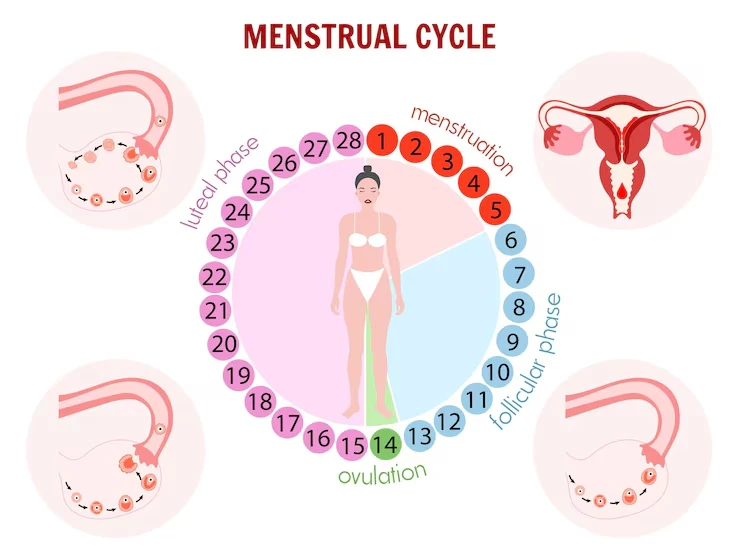The menstrual cycle is a vital part of every woman's reproductive health, yet it’s often misunderstood or overlooked. Whether you’re just beginning your journey with periods or seeking a deeper understanding of your body, learning about the menstrual cycle can empower you to take better care of your health.
What is the Menstrual Cycle?
The menstrual cycle is the monthly hormonal process a woman’s body undergoes to prepare for a potential pregnancy. It begins on the first day of menstruation (your period) and ends on the day before your next period starts. This cycle isn’t just about bleeding—it's a complex, finely tuned process involving several hormones that affect the uterus, ovaries, brain, and overall health. If you're wondering what is menstrual cycle, it’s the regular natural change that occurs in the female reproductive system to make pregnancy possible. A typical cycle lasts about 28 days, though anywhere between 21 and 35 days is considered normal. Every woman’s cycle is unique, and even your own cycle can vary from month to month.Menstrual Cycle Phases
The menstrual cycle phases are divided into four distinct parts. Each phase plays a critical role in the body’s preparation for pregnancy.1. Menstrual Phase (Days 1–5)
This is the start of the cycle and the phase most women are familiar with—menstruation. If pregnancy hasn’t occurred, the uterine lining that had built up sheds, resulting in bleeding.Symptoms during menstruation may include:
- Cramps in the lower abdomen
- Bloating
- Mood swings
- Headaches
- Fatigue
2. Follicular Phase (Days 1–13)
Overlapping with the menstrual phase, this phase starts on the first day of your period and ends with ovulation. The brain releases Follicle Stimulating Hormone (FSH), which stimulates the ovaries to produce follicles, each containing an egg. One dominant follicle will mature. Estrogen rises during this phase, helping rebuild the uterine lining.3. Ovulation Phase (Day 14, in a 28-day cycle)
Ovulation typically occurs around the middle of the cycle. A surge in Luteinizing Hormone (LH) causes the mature egg to be released from the ovary. This egg travels down the fallopian tube, where it may be fertilized. This is the fertile window—the best time to try for pregnancy.4. Luteal Phase (Days 15–28)
After ovulation, the ruptured follicle becomes the corpus luteum, which produces progesterone. This hormone prepares the uterine lining for a fertilized egg. If fertilization doesn’t happen, the corpus luteum breaks down, hormone levels drop, and menstruation begins again. Understanding these menstrual cycle phases can help you identify changes in your mood, energy, and body, and anticipate ovulation or your next period.Common Symptoms During Menstruation
Menstruation can come with various physical and emotional symptoms, including:- Lower abdominal cramps
- Back pain
- Tender breasts
- Digestive changes (like bloating or diarrhea)
- Mood fluctuations or irritability
- Acne breakouts
Why Understanding the Menstrual Cycle Matters for Women’s Health
Understanding the menstrual cycle isn’t just about tracking periods. It’s a window into your hormonal health and overall wellness. Here’s why the importance of menstrual cycle knowledge is so crucial:- Identifies Reproductive Health Issues: Irregular cycles can signal conditions like PCOS, thyroid problems, or hormonal imbalances.
- Aids in Family Planning: Knowing your menstrual cycle phases helps identify your fertile window.
- Monitors Hormonal Health: Sudden changes in cycle length, flow, or symptoms can indicate underlying health problems.
- Improves Quality of Life: Recognizing patterns helps manage PMS and plan for high or low energy days.
Tracking Your Menstrual Cycle
Keeping track of your menstrual cycle helps you stay informed and prepared. Here’s how:- Calendar Method: Mark the first day of your period each month to understand your cycle length.
- Apps: Menstrual tracking apps offer predictions, symptom logging, and reminders.
- Basal Body Temperature (BBT): A slight increase in BBT after ovulation can confirm your fertile window.
- Cervical Mucus Monitoring: Texture and amount of discharge change during menstrual cycle phases, offering clues about ovulation.
When to See a Doctor
While changes in your menstrual cycle are normal at different life stages, certain signs shouldn’t be ignored:- Cycles shorter than 21 or longer than 35 days
- Missing periods without pregnancy
- Extremely heavy or painful periods
- Spotting between periods
- Severe mood changes affecting daily life

